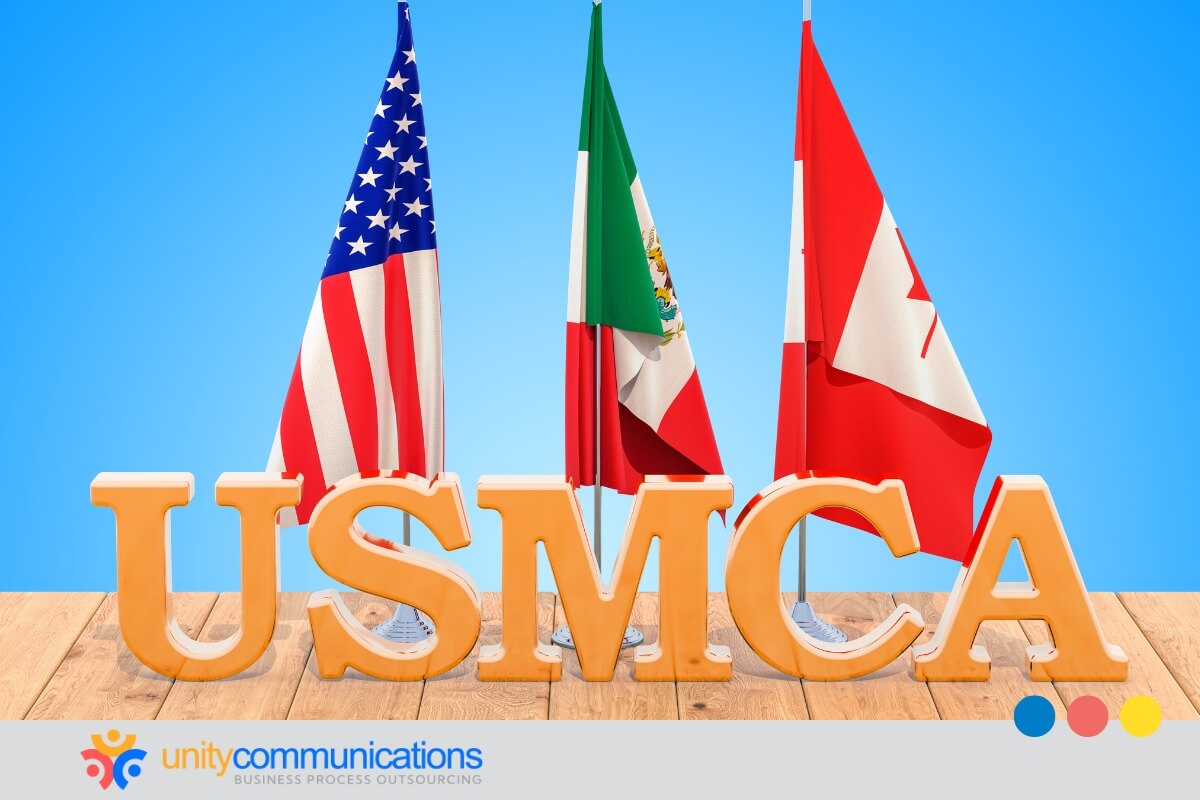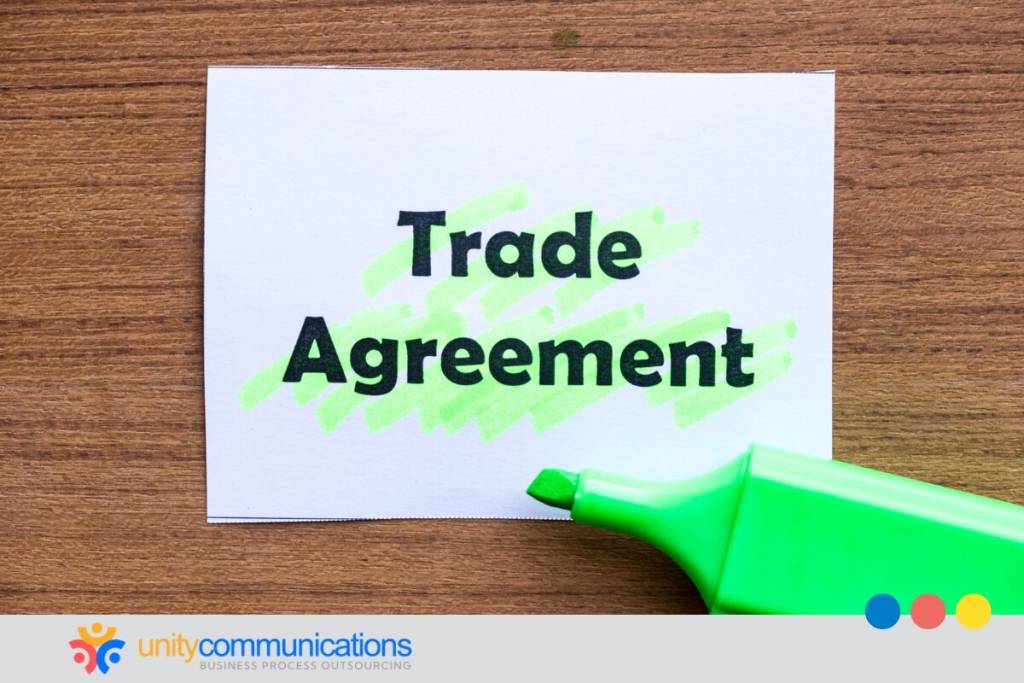IN THIS ARTICLE
Table of Contents
Outsourcing allows businesses to access global resources, fostering opportunities for cross-border collaboration. This dynamic has resulted in heightened competition and cooperation among nations, prompting shifts in governmental interactions.
Moreover, business process outsourcing (BPO) has introduced novel challenges, such as influencing international trade agreements and safeguarding intellectual property rights.
This article explores the relationship between BPO operations and international trade agreements. It also discusses the best practices to foster compliance. Keep reading to learn more!
Overview of BPO and Key International Trade Agreements

So, what is BPO? It is the process of contracting business functions to an external service provider. The roots of outsourcing can be traced back to as early as the 18th century, particularly during the Industrial Revolution.
However, the prominence of outsourcing and BPO companies emerged in the latter half of the 20th century. A key factor contributing to this expansion was the increasing scale of global trade. It allowed enterprises to tap into new markets, whether domestic or international.
These advancements introduced many opportunities for companies to collaborate beyond their organizational and geographical confines. BPO quickly gained widespread popularity by offering reduced costs and enhanced operational efficiency. Now, the BPO industry is valued at $280.64 billion.
Due to their nature and scale, BPO operations are often impacted by the following international trade agreements:
- General Agreement on Trade in Services (GATS). The GATS is part of the World Trade Organization (WTO) agreements. It aims to liberalize international trade in services, including BPO. Members commit to opening their markets to foreign service providers.
- United States-Mexico-Canada Agreement (USMCA). The UMSCA replaced the North American Free Trade Agreement (NAFTA) in 2020. It includes provisions on cross-border data flows, which are crucial for BPO activities involving data processing and storage.
- Comprehensive and Progressive Agreement for Trans-Pacific Partnership (CPTPP). The CPTPP is a trade agreement between Australia, Canada, Chile, Mexico, New Zealand, Peru, and certain Asian countries. It addresses various aspects of trade, including services, and promotes cooperation in areas relevant to BPO.
- Philippine-European Union (EU) Free Trade Agreement (FTA). According to a report commissioned by the EU, the PH-EU FTA promises to promote more business opportunities with BPO.
- EU-UK Trade and Cooperation Agreement. Following the UK’s exit from the EU, this agreement governs trade relations between the EU and the UK. It has implications for service providers, including BPO companies, with provisions on market access and regulatory cooperation.
- ASEAN Economic Community (AEC). The Association of Southeast Asian Nations (ASEAN) has been working toward economic integration. The AEC aims to create a single market and production base, facilitating the flow of goods, services, and skilled labor, which can impact BPO operations in the region.
- India-Singapore Comprehensive Economic Cooperation Agreement (CECA). This agreement facilitates economic cooperation between India and Singapore. It includes provisions related to service trade, which can impact the BPO sector.
- Korea-United States Free Trade Agreement (KORUS). The KORUS is a trade agreement between South Korea and the United States. It addresses various trade aspects, including services, which can affect BPO engagements between the two countries.
- African Continental Free Trade Area (AfCFTA). The AfCFTA aims to create a single market for goods and services in Africa. While primarily focused on goods, it could affect BPO services as the African market integrates.
Trade agreements are subject to changes, renegotiations, or replacements. BPO firms and companies contracting their services should stay informed about the latest developments in international trade agreements and adapt their strategies accordingly.
Impact of Trade Agreements on BPO Operations
Trade agreements can significantly impact BPO deals, influencing various aspects of cross-border business activities.
Trade agreements can diminish tariffs and improve the landscape for outsourcing. These agreements may result in heightened competition, reduced prices, and expanded global market entry, ultimately benefiting outsourcing firms and the countries where they operate.
Here are some significant ways that international trade agreements affect BPO operations and contracts:
- Market access and entry. Trade agreements often include provisions that facilitate market access for service providers. They can reduce barriers to entry for BPO companies in foreign markets, allowing them to expand their operations.
- Regulatory environment. Agreements may address regulatory issues, including standardization and harmonization of regulations. They can create a more predictable and transparent regulatory environment for BPO services, reducing uncertainty for companies operating across borders.
- Cross-border data flows. Trade agreements may include provisions related to cross-border data flows, ensuring the free movement of data across borders. This is crucial for BPO operations that rely on the seamless exchange of information.
- Intellectual property (IP) protection. IP rights are essential for BPO companies, especially those involved in knowledge-intensive services. Trade agreements often include provisions protecting IP, thus safeguarding the interests of service providers.
- Service liberalization. Agreements such as GATS aim to liberalize trade in services, including BPO. This can increase service provider opportunities by opening markets and promoting fair competition.
- Investment protection. BPO companies often make significant investments in foreign markets. Trade agreements may include provisions to protect foreign investments, providing a more secure environment for BPO operations.
- Dispute resolution mechanisms. Trade agreements typically establish mechanisms for resolving disputes between countries. These can benefit BPO companies in conflicts or challenges related to market access, regulatory compliance, or other issues.
- Labor mobility. Some trade agreements address the movement of skilled labor. This can be relevant for BPO operations that require the transfer of personnel across borders, ensuring that companies can access the talent they need.
- Costs and tariffs. Tariff reductions or eliminations can impact the cost structure of BPO services. Trade agreements that reduce tariffs on goods and services may indirectly benefit outsourcing companies by lowering costs for inputs and resources.
- Regional integration. BPO companies often consider regional markets for expansion. Regional trade agreements, such as those within the EU or ASEAN, can facilitate regional integration and provide a more cohesive market for BPO services.
The Role of BPO in International Trade and the Global Economy

Fifty-seven percent of companies outsource to experience significant cost savings without compromising work quality. The resulting surplus capital can be redirected towards business development, allowing for workforce expansion and the integration of cutting-edge technologies. The effect is continuous improvement, contributing positively to economic growth.
BPO transcends national boundaries, facilitating global connections among businesses and fostering international trade. The unique advantage of outsourcing lies in overcoming geographical constraints, allowing companies to establish relationships with collaborators and customers worldwide.
Moreover, BPO offers the distinct benefit of time zone differences, enabling business operations to run 24/7. While some may experience communication challenges due to time zone variations, the advantage of a continuous workflow, even during off-hours, is significant.
For instance, maintaining contact with customers around the clock is achievable in customer service roles, enhancing overall operational efficiency.
Legal and Trade Compliance for BPO Operations
BPO operations must comply with international laws and trade agreements, especially if they operate globally. Adhering to relevant laws and regulations is essential for maintaining ethical business practices, avoiding legal issues, and ensuring a smooth flow of operations. Here are critical aspects of legal and trade compliance for BPO operations:
- Export control and sanctions. BPO companies must comply with export control laws, especially when dealing with technology or services that are subject to restrictions. Understanding and adhering to international sanctions is also critical to avoid legal repercussions.
- Contractual compliance. Ensure that contracts with clients and vendors are legally sound and comply with relevant laws. Clearly define the scope of services, responsibilities, and agreement terms.
- Tax compliance. BPO operations may have tax implications in different jurisdictions. Complying with local and international tax laws, including transfer pricing regulations, is crucial to avoid tax-related issues.
- Customs and trade compliance. Compliance with customs regulations is essential for BPO operations involving the physical movement of goods or equipment across borders. Proper documentation, duties, and adherence to import/export controls are necessary.
The Bottom Line

BPO firms and teams must stay informed of the specific provisions of international trade agreements that may affect their operations and adapt their strategies accordingly. Trade policy and agreement changes should also be monitored to assess potential opportunities or challenges in the dynamic global business environment.
Looking for a reliable BPO partner? Unity Communications can help. Let’s connect to find out more.





